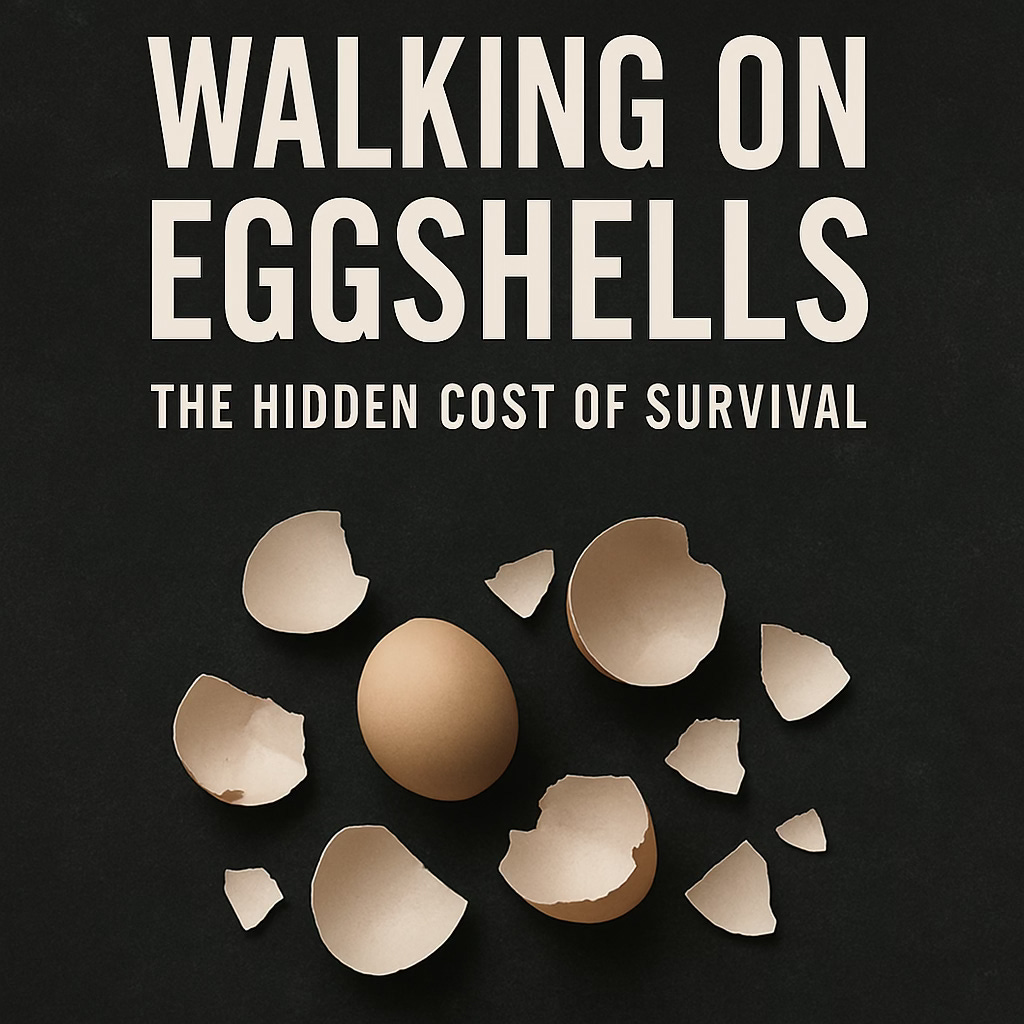Chapter 2 - Walking on Eggshells: The Hidden Cost of Survival
From THX Series Hub: The Narcissist’s Playbook & The Life After
Healing After Narcissism
(Framed by 12 THX Utilities from the THX Framework)
Author’s Note: This post contains descriptions of emotional, physical, and psychological abuse, including medical trauma, coercive control, and threats. Please take care as you read.
There’s a kind of exhaustion that lives in your bones when your life becomes a negotiation with fear.
Not loud, dramatic fear.
Not the kind that announces itself.
But the quiet, chronic kind—the kind that makes your shoulders stay tense for years, your breath shallow, your mind always scanning.
That was my normal.
I lived in a home where I never knew who I was going to get: charming or cruel, proud or punishing, silent or screaming.
A place where niceness was used like a mask. Where affection came with a hook. Where love had terms and expiration dates.
And I did what millions of people do: I adapted. I minimized. I stayed.
But adaptation has a cost.
I lost my availability to myself.
When you're focused on someone else’s moods, needs, threats, and expectations, you abandon your own. I didn't know what I felt unless it threatened her. I didn’t know what I needed unless it would upset her. I became skilled at disappearing.
I lost access to joy, to rest, to intimacy.
Even simple things—watching a show, buying a book, calling a friend—required strategic calculation. Would this be used against me later? Would it set her off? Everything was filtered through the question: Is it safe to want this?
I lost security—physically and emotionally.
She threatened to leave. To take the car. To empty the bank account. To abandon me—and the kids.
I nearly died from anaphylaxis more than once—incidents she triggered through carelessness or cruelty.
And in the middle of one of those moments, instead of helping, she looked at me and said,
“You’re not allergic to this.”
I was.
I lost clarity.
Gaslighting made me question everything—memories, facts, timelines, even my body’s signals.
Reality was no longer a shared experience. It was whatever she needed it to be in the moment.
And I started to believe that maybe I was the broken one.
I lost the ease of existence.
Every word was a potential minefield. Every silence, a verdict.
I rehearsed conversations in my head before speaking. I checked the air in a room like prey checks the wind.
Life didn’t feel livable—just survivable.
I lost accuracy—not in the world, but in my own reflection.
I couldn’t see myself clearly anymore.
Am I a good father? A competent partner? Am I the problem?
When someone denies your reality long enough, you start believing they’re the map and you’re the mistake.
I lost speed.
Everything took longer because everything was uncertain.
Getting out of the house. Planning a meal. Making a decision.
Even healing now is slower than it might have been—because the wound was deep and unrelenting.
I lost consistency.
There were no reliable rules of engagement.
One day, a joke would land. The next, it would spark rage.
So I stopped joking.
I became flat. Controlled. Contained.
I never got closure.
Apologies were rare and conditional.
If I was hurt, it was my fault for being weak.
If she was cruel, it was because I “made her feel that way.”
I lived in endless loops of unresolved conflict and manufactured guilt.
I lived in emotions I couldn’t name.
Fear, mostly. Shame. Numbness.
Tiny slivers of hope when things were calm, followed by the crash of disappointment when the storm returned.
Joy became suspicious. Peace felt dangerous.
I was drained of every resource—time, money, energy, reputation.
I gave more than I had.
I gave up promotions, friendships, opportunities—because I had to keep the balance just right to prevent another episode.
And worst of all, I lost my sense of value.
Not just in the relationship.
In the world.
I forgot that I mattered.
I forgot that I was worthy of anything more than managing someone else’s dysfunction.
But here’s the part that matters most:
I did survive.
I did protect my daughters.
I did find a way out—not just physically, but emotionally.
And I began to rebuild, one utility at a time.
This is the work of healing after narcissistic abuse:
To stop walking on eggshells and start standing on your own ground.
To name what was broken—not to stay in the pain, but to see it clearly, so it can no longer control you.
Next, I’ll share why I stayed—not with shame, but with compassion. Because understanding the psychology of survival is part of the way we heal.
Reflection Prompt
What are the utilities you’ve lived without for too long?
Which ones—like safety, clarity, or value—were missing from your life?
What would it mean to start rebuilding them, one at a time?
You don’t need all the answers.
Just begin with the truth.

Interpretation: Cracked shells scattered on dark ground evoke the fragility of everyday life in an abusive environment. The stark, simple typography reinforces the emotional tension and cost of living in a state of constant hypervigilance.

